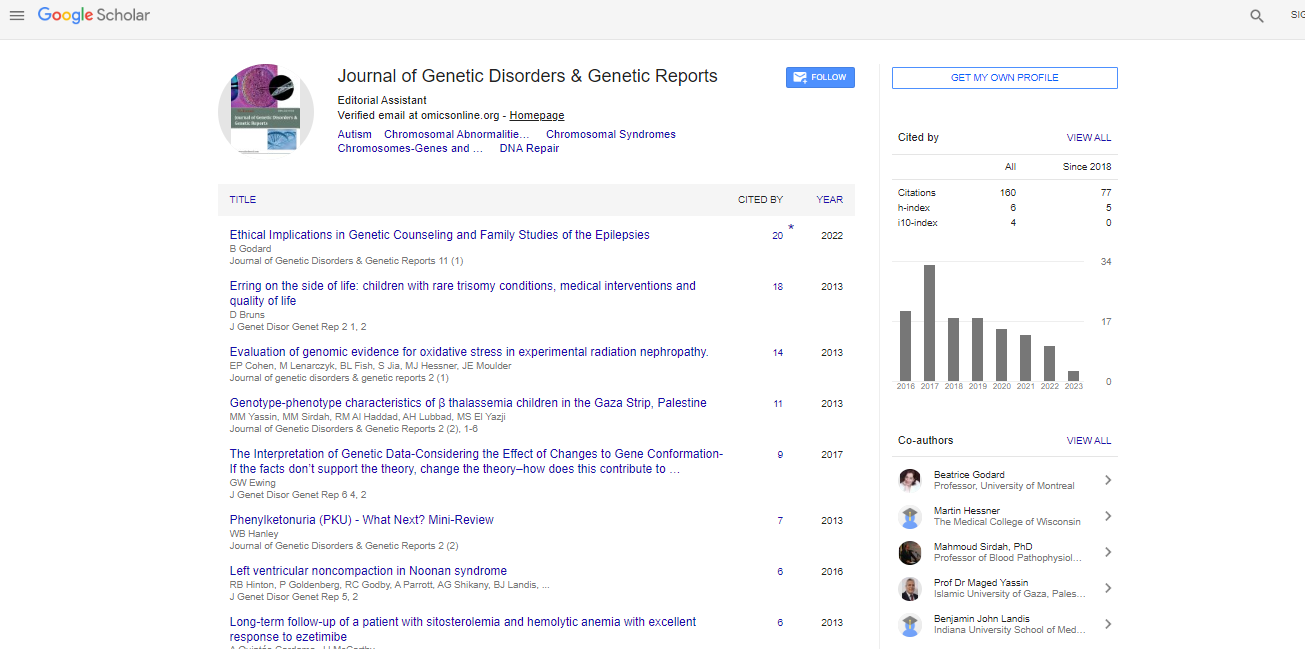Opinion Article, Vol: 12 Issue: 1
Genetic Engineering Ethics and Applications
Amanda J*
Department of Medicine, Schulich School of Medicine and Dentistry, Western University, 1151 Richmond Street, London N6A 5C1, ON, Canada
*Corresponding Author: Amanda J,
Department of Medicine, Schulich School of Medicine and Dentistry, Western University, 1151 Richmond Street, London N6A 5C1, ON, Canada;
E-mail: Amanda@sjhc.london.edu
Received date: 25 January, 2023, Manuscript No. JGDGR-23-92053;
Editor assigned date: 27 January, 2023, Pre QC No. JGDGR-23-92053(PQ);
Reviewed date: 13 February, 2023, QC No. JGDGR-23-92053;
Revised date: 20 February, 2023, Manuscript No. JGDGR-23-92053(R);
Published date: 27 February, 2023, DOI: 10. 4172/2576-1439.1000192
Citation: Amanda J (2023) Genetic Engineering Ethics and Applicationst. J Genet Disor Genet Rep 12:1.
Description
Genetic engineering is the process of manipulating the genetic material (DNA) of an organism to modify its characteristics or create new traits. This can be done by inserting, deleting, or modifying genes, which can lead to changes in an organism's physical, physiological, or behavioral traits. Genetic engineering can be used to produce organisms with desired characteristics or to correct genetic defects that cause diseases.
One of the most common applications of genetic engineering is in the production of Genetically Modified Organisms (GMOs), which are organisms that have had their genetic material altered to give them new traits or to enhance existing ones. GMOs are widely used in agriculture to produce crops that are resistant to pests, diseases, or environmental stress, or that have increased nutritional value or longer shelf life.
Genetic engineering is also used in medicine to develop new treatments for diseases or to improve existing ones. For example, scientists have developed gene therapy techniques that can replace or repair faulty genes in individuals with genetic disorders, such as cystic fibrosis or sickle cell anemia.
However, genetic engineering raises ethical concerns, particularly regarding the safety and long-term effects of introducing genetically modified organisms into the environment, and the potential for genetic engineering to be used for non-medical purposes, such as enhancing physical or intellectual abilities.
Overall, genetic engineering is a powerful tool that has the potential to revolutionize many aspects of human life, from agriculture to medicine. However, it is important to carefully consider the ethical and social implications of genetic engineering, and to ensure that it is used in a responsible and sustainable manner.
Genetic engineering has many potential applications in various fields, including agriculture, medicine, and industry.
Applications of genetic engineering
Agriculture: Genetic engineering can be used to create crops that are more resistant to pests and diseases, can withstand harsh environmental conditions, and have improved nutritional value. For example, genetic engineering has been used to produce crops that are resistant to herbicides, such as Roundup-ready soybeans, or crops that produce their own insecticides, such as Bt cotton.
Medicine: Genetic engineering has led to the development of new treatments for various genetic disorders and diseases, such as cystic fibrosis, sickle cell anemia, and cancer. Gene therapy, which involves replacing or modifying defective genes, has shown promising results in clinical trials for a variety of diseases.
Industry: Genetic engineering can be used to produce enzymes and proteins for use in various industrial processes, such as the production of biofuels and the synthesis of pharmaceuticals. Genetic engineering can also be used to create bacteria that can break down environmental pollutants, such as oil spills.
Forensics: Genetic engineering can be used in forensics to analyze DNA evidence from crime scenes, identify suspects, and establish paternity or familial relationships.
Biotechnology: Genetic engineering can be used in biotechnology to create new products, such as genetically engineered vaccines and diagnostic tests. It can also be used to modify cells and tissues for use in tissue engineering and regenerative medicine.
Overall, genetic engineering has the potential to revolutionize many fields and provide solutions to some of the world's most pressing challenges. However, it is important to carefully consider the ethical and social implications of genetic engineering, and to ensure that it is used in a responsible and sustainable manner.
 Spanish
Spanish  Chinese
Chinese  Russian
Russian  German
German  French
French  Japanese
Japanese  Portuguese
Portuguese  Hindi
Hindi 



